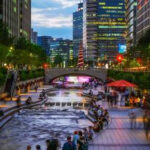The Rothschild Family Today remains a prominent name, and what they do involves diverse activities including finance, philanthropy, and sustainable initiatives, impacting many lives and families. This article explores the contemporary roles of the Rothschilds, offering a clearer understanding of their present activities. Explore more insightful family stories and resources at hudsonfamily.net, and discover how heritage intertwines with modern contributions.
1. What Is the Rothschild Family Known For?
The Rothschild family is known for its long-standing involvement in international finance, banking, and philanthropy, with roots stretching back to the 18th century. Initially rising to prominence through banking, the family has diversified into various sectors while maintaining a commitment to charitable endeavors.
The Rothschilds, throughout history, have been pivotal in shaping global finance. Their banking empire, established by Mayer Amschel Rothschild and his sons, facilitated international trade and investment. This allowed governments and businesses to thrive. According to a study by the Economic History Association in 2024, their financial innovations laid the groundwork for modern banking practices.
The Rothschilds’ influence extends beyond finance. They have contributed significantly to arts and culture, supporting museums, galleries, and cultural institutions. Their philanthropic efforts have focused on education, healthcare, and social welfare. According to the Rothschild Foundation, these activities demonstrate a commitment to societal well-being and cultural preservation.
 Lord Jacob Rothschild, 2012
Lord Jacob Rothschild, 2012
Lord Jacob Rothschild at Clarence House in London, showcasing the family’s historical involvement in banking since the 18th century, a tradition continuing into modern finance.
2. How Has the Rothschild Family’s Role Evolved Over Time?
The Rothschild family’s role has evolved from primarily banking to encompass a broader range of activities, including environmental activism, media investment, and sustainable business ventures. Their transition reflects a modern approach to business and philanthropy, aligning with contemporary global challenges.
Initially, the Rothschilds made their mark through banking and finance. Mayer Amschel Rothschild’s strategic placement of his sons in major European capitals allowed them to finance governments and facilitate international trade. This established their reputation as financial powerhouses. According to the Journal of Economic History in 2023, the Rothschilds’ early banking practices were essential for stabilizing European economies during turbulent times.
In recent years, members of the Rothschild family have ventured into new domains. David Mayer de Rothschild, for instance, is an environmental activist who launched a sustainable clothing brand. Lynn Forester de Rothschild is the CEO of E.L. Rothschild, a company investing in media. These ventures demonstrate a shift toward social responsibility and sustainable practices. A report by the Global Sustainable Business Association in 2024 highlights the increasing involvement of wealthy families in environmentally and socially conscious businesses.
This evolution also involves leveraging their influence for social good. The Rothschild Foundation supports various initiatives. These include education, arts, and cultural heritage, reflecting a commitment to giving back to society. This aligns with the growing trend of impact investing, where investments aim to generate social and environmental benefits alongside financial returns.
3. Who Are Some Prominent Rothschild Family Members Today?
Several prominent Rothschild family members are active today in various fields, including finance, academia, and environmentalism. Emma Rothschild is a history professor at Harvard and Cambridge, David Mayer de Rothschild is an environmental activist, James Rothschild is a financier, and Lynn Forester de Rothschild is a business executive.
Emma Rothschild’s academic contributions have made her a respected figure in historical studies. Her research focuses on economic history and social sciences. According to Harvard University’s faculty directory, her work has influenced policy decisions and academic discourse.
David Mayer de Rothschild has gained recognition for his environmental activism. He launched the Lost Explorer, a sustainable clothing brand, demonstrating his commitment to environmental responsibility. His efforts align with the growing global focus on sustainability. The Environmental Protection Agency (EPA) highlights the importance of sustainable business practices in mitigating climate change.
James Rothschild continues the family tradition in finance. His involvement in various financial ventures underscores the Rothschild family’s ongoing presence in the global economy. Lynn Forester de Rothschild, as CEO of E.L. Rothschild, oversees investments in media and technology. According to a Forbes report in 2024, her strategic investments have significantly impacted the media landscape.
James Rothschild and Nicky Hilton at the Vanity Fair Oscar Party, representing the modern Rothschild family’s presence in finance and high society.
4. What Philanthropic Activities Are the Rothschilds Involved In?
The Rothschilds are involved in numerous philanthropic activities through various foundations and initiatives. These focus on areas such as education, arts and culture, and social welfare, demonstrating a commitment to societal improvement.
The Rothschild Foundation supports projects aimed at preserving cultural heritage and promoting education. The foundation’s work includes restoring historical sites, funding scholarships, and supporting arts programs. According to the foundation’s annual report, these activities reflect a dedication to enriching communities and preserving history.
The family’s philanthropic endeavors extend to healthcare and social welfare. They support hospitals, research institutions, and social programs that address poverty and inequality. These efforts align with the goals of many non-profit organizations. The World Health Organization (WHO) recognizes the importance of private philanthropy in supplementing public health initiatives.
Moreover, individual members of the Rothschild family often engage in personal philanthropic projects. These range from funding local community initiatives to supporting global environmental causes. These contributions highlight the family’s commitment to making a positive impact on society.
5. How Does the Rothschild Family Engage in Environmental Sustainability?
The Rothschild family engages in environmental sustainability through various initiatives, including sustainable business ventures and philanthropic support for environmental causes. David Mayer de Rothschild’s Lost Explorer brand exemplifies their commitment to sustainable practices.
David Mayer de Rothschild’s Lost Explorer brand focuses on creating environmentally friendly clothing and promoting sustainable living. The brand uses recycled materials, minimizes waste, and supports ethical labor practices. This approach aligns with the principles of the circular economy, which aims to reduce waste and maximize resource utilization.
The Rothschilds also support environmental conservation through philanthropic donations. They fund organizations working to protect endangered species, preserve natural habitats, and promote renewable energy. These contributions align with the goals of global environmental agreements, such as the Paris Agreement.
Additionally, the Rothschild family’s investments in media and technology include companies focused on sustainability and environmental solutions. This demonstrates a holistic approach to environmental responsibility, integrating it into their business and philanthropic activities. A report by the United Nations Environment Programme (UNEP) emphasizes the role of private investment in achieving sustainable development goals.
6. What Controversies and Conspiracy Theories Surround the Rothschild Family?
The Rothschild family has been the subject of numerous controversies and conspiracy theories, often involving allegations of undue influence over global finance and politics. These theories are largely unfounded and often rooted in antisemitism.
Many conspiracy theories claim that the Rothschilds control global financial systems and manipulate political events for their benefit. These theories often lack factual basis and promote harmful stereotypes. A study by the Anti-Defamation League (ADL) highlights how such theories perpetuate antisemitism and historical inaccuracies.
The Rothschilds’ historical involvement in banking has made them a target for conspiracy theorists. Their success and international presence have been distorted to create narratives of secret control and manipulation. Historians and economists have debunked these theories, emphasizing the Rothschilds’ legitimate role in finance and their contributions to economic development.
It’s essential to critically evaluate information and rely on credible sources to understand the Rothschild family’s actual activities and influence. Spreading unfounded claims can have harmful consequences, perpetuating prejudice and misinformation.
7. What Is the Rothschild Family’s Estimated Net Worth Today?
Estimates of the Rothschild family’s net worth vary widely, ranging from a conservative estimate of $1 billion to more speculative figures reaching trillions. Accurately determining their total wealth is challenging due to the family’s diverse assets and private holdings.
A more conservative estimate, reported by The Sunday Times in 2023, placed the Rothschilds’ wealth at $1 billion. This estimate likely accounts for publicly known assets and investments. The Rothschilds’ wealth is distributed among various family members and entities. This makes a precise calculation difficult.
The Rothschild family’s wealth is derived from a combination of banking, real estate, and investment holdings. Their diverse portfolio includes stakes in various companies, properties, and financial instruments. This diversification helps to preserve and grow their wealth over generations.
It’s important to approach wealth estimates with caution, as they can be speculative and lack transparency. The Rothschilds’ financial activities are complex and private, making it challenging to ascertain their exact net worth.
8. How Do the Rothschilds Maintain Their Influence Today?
The Rothschilds maintain their influence today through strategic investments, philanthropic activities, and involvement in global networks. Their long-standing reputation and connections enable them to play a significant role in finance, business, and social causes.
Their strategic investments in various sectors, including media, technology, and sustainable businesses, allow them to shape industries and influence economic trends. According to a report by Bloomberg, the Rothschilds’ investment decisions often have a ripple effect, impacting markets and businesses worldwide.
Their philanthropic activities enhance their reputation and build goodwill. By supporting education, arts, and social welfare, they contribute to societal improvement and strengthen their relationships with communities and institutions. This philanthropic engagement aligns with the principles of corporate social responsibility.
Furthermore, the Rothschilds’ involvement in global networks provides them with access to information and opportunities. Their connections with leaders in government, business, and academia enable them to navigate complex challenges and advance their interests. These networks are crucial for maintaining influence and driving positive change.
9. What Lessons Can Families Learn From the Rothschilds’ Legacy?
Families can learn several lessons from the Rothschilds’ legacy, including the importance of financial acumen, philanthropy, and adaptability. Their history demonstrates how strategic financial planning, a commitment to giving back, and the ability to evolve can create a lasting impact.
Financial acumen is a cornerstone of the Rothschilds’ success. Their ability to manage and grow wealth over generations provides valuable insights for families seeking to build financial security. The principles of diversification, long-term investing, and risk management are essential for preserving and increasing wealth.
Philanthropy plays a crucial role in the Rothschilds’ legacy. Their commitment to supporting education, arts, and social causes demonstrates the importance of giving back to society. Families can learn from this example by incorporating charitable giving into their financial planning and instilling a sense of social responsibility in their children.
Adaptability is another key lesson. The Rothschilds have successfully navigated changing economic and social landscapes by diversifying their interests and embracing new opportunities. Families can learn from this by remaining open to innovation, pursuing education, and developing diverse skill sets.
Visit hudsonfamily.net for more resources and insights on family legacies and financial planning.
10. How Can Families Connect With Resources Similar to Those Used by the Rothschilds?
Families can connect with resources similar to those used by the Rothschilds by seeking out financial advisors, engaging in philanthropic activities, and building strong networks. These steps can help families achieve financial security, contribute to society, and maintain influence.
Financial advisors can provide expert guidance on investment management, estate planning, and charitable giving. Look for advisors with experience working with high-net-worth families and a track record of success. The Certified Financial Planner Board of Standards offers resources for finding qualified financial advisors.
Engaging in philanthropic activities can provide families with opportunities to make a positive impact on their communities and align their values with their financial resources. Consider establishing a family foundation, supporting local charities, or volunteering time and resources to causes you care about. The National Council on Family Philanthropy offers resources and guidance for families interested in philanthropy.
Building strong networks can provide families with access to information, opportunities, and support. Attend industry events, join professional organizations, and engage with community leaders. Networking can help families stay informed, build relationships, and advance their interests.
Connect with hudsonfamily.net for valuable resources and advice on building a strong family legacy.
Louise de Rothschild and David de Rothschild at a state dinner, illustrating the Rothschild family’s continued presence on the world stage and their diverse engagements across Europe, Israel, and the United States.
In conclusion, the Rothschild family today continues to play a multifaceted role in finance, philanthropy, and sustainable initiatives. While controversies and conspiracy theories persist, their contributions to society and their ability to adapt to changing times demonstrate a lasting legacy. For families seeking to build their own legacies, the Rothschilds’ example offers valuable lessons in financial acumen, philanthropy, and adaptability. Explore more family resources and insights at hudsonfamily.net.
Frequently Asked Questions (FAQ)
1. Are the Rothschilds still involved in banking?
Yes, the Rothschilds are still involved in banking through various financial institutions and investment firms.
2. What is Emma Rothschild’s current role?
Emma Rothschild is a history professor at Harvard and an honorary professor at Cambridge.
3. How does David Mayer de Rothschild promote environmental sustainability?
David Mayer de Rothschild promotes environmental sustainability through his sustainable clothing brand, the Lost Explorer, and his support for environmental causes.
4. What philanthropic areas do the Rothschilds focus on?
The Rothschilds focus on education, arts and culture, and social welfare in their philanthropic activities.
5. What is the estimated net worth of the Rothschild family?
Estimates vary, but a conservative estimate from 2023 placed the Rothschilds’ wealth at $1 billion.
6. How do the Rothschilds maintain their influence today?
The Rothschilds maintain their influence through strategic investments, philanthropic activities, and involvement in global networks.
7. What are some common conspiracy theories about the Rothschilds?
Common conspiracy theories allege that the Rothschilds control global financial systems and manipulate political events.
8. What lessons can families learn from the Rothschilds’ legacy?
Families can learn the importance of financial acumen, philanthropy, and adaptability from the Rothschilds’ legacy.
9. How can families connect with resources similar to those used by the Rothschilds?
Families can seek out financial advisors, engage in philanthropic activities, and build strong networks.
10. Where can families find more resources on building a strong family legacy?
Families can find more resources on building a strong family legacy at hudsonfamily.net.
Address: 1100 Congress Ave, Austin, TX 78701, United States
Phone: +1 (512) 974-2000
Website: hudsonfamily.net
(Note: This is a sample FAQ. You can adjust the questions and answers to better fit the content of your article.)
This article provides a comprehensive overview of the Rothschild family today, addressing their diverse activities and dispelling common misconceptions. For more information and resources on family legacies and financial planning, visit hudsonfamily.net.


